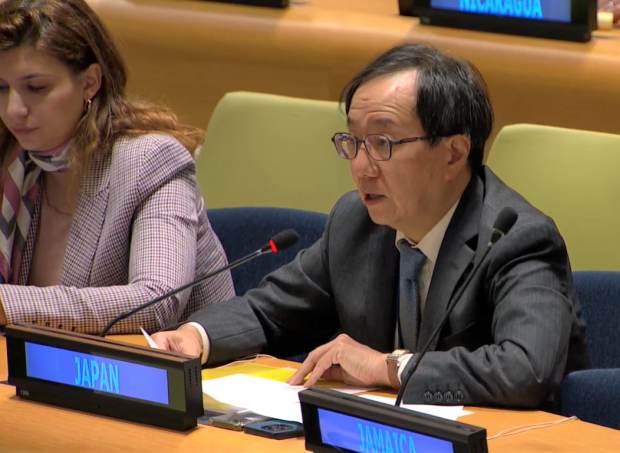安保理改革に関する政府間交渉(IGN)における山﨑大使のステートメント
令和7年5月29日

(As delivered)
Thank you, Mr. Chair.
I deliver this statement on behalf of the G4 – Brazil, Germany, India, and my own country, Japan.
Thank you very much for convening this round of structured dialogues dedicated to models of reform. As shown in the previous sessions, concrete discussions based on a model are more effective than abstract speeches to move towards creating a consolidated model.
With this in mind, the G4 is grateful to CARICOM for its constructive and active participation, including through the presentation of its model today.
Mr. Chair,
The G4 fully supports CARICOM's position on expanding both the permanent and non-permanent categories. As all of us here agree, the Security Council must be reformed urgently to be more representative and equitable, reflecting the current geopolitical realities. To this end, expanding only the non-permanent category will not address the existing imbalances in the Council. The G4 reiterates that it is crucial to expand the number of both permanent and non-permanent members.
The G4 shares positions with CARICOM on other issues as well. For instance, both groups advocate for increased transparency and accountability within the Security Council. Both groups also support the idea that each elected member should be able to hold the Council presidency at least once during its term. Both groups additionally concur on the need for the Security Council to be more accountable to the General Assembly, including by providing more analytical reports.
Furthermore, both groups support expanding permanent seats to Africa, Asia-Pacific, Latin America and the Caribbean, and Western Europe as well as non-permanent seats to Africa, Asia-Pacific, Latin America and the Caribbean, and Eastern Europe. The G4 has underlined that to better reflecting a wider plurality of views in the Council, adequate representation of Small Island Developing States (SIDS) may be considered in the non-permanent category. Both groups are also calling for a review of the situation no later than 15 years after the amendments of the Charter enter into force.
There are also commonalities between the G4 and CARICOM in the views on the veto. The G4 echoes the significance of ensuring equal responsibilities and obligations between the current and new Permanent Members. While Our model proposes that the new permanent members do not exercise the veto-right until the above-mentioned review is completed, the G4 is open to discussing various proposals on the question.
Mr. Chair,
As we have indicated time and again, what we need now is to engage in concrete negotiations based on a text, which should begin as soon as possible, with clearly defined timelines. In this regard, the G4 strongly hopes to see the early submission of models from other regional groups including Africa to facilitate work on a consolidated model that reflects the positions and proposals by Member States.
Thank you.
